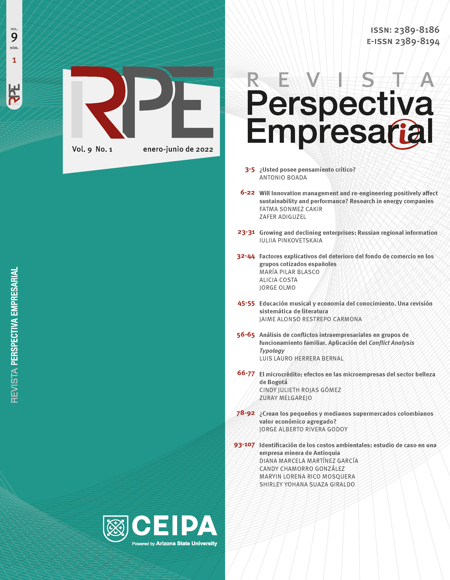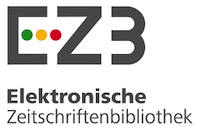Factors explaining the impairment of goodwill in Spanish listed groups
Factores explicativos del deterioro del fondo de comercio en los grupos cotizados españoles
##plugins.themes.bootstrap3.article.main##
Objective. To analyze which factors may influence the decision to recognize goodwill impairment losses when the net book value exceeds its recoverable amount.
Methodology. A multivariate logistic regression model was applied to a sample of listed companies, all of them dominating groups of companies presenting consolidated accounts in
Spain during the period 2014-2018. Results. The losses recorded by the entity, impairments booked in previous years, as well as size, are aspects that positively influence the recognition
of goodwill impairment. Conclusions. This work detects a certain discretionary behavior on
the part of managers due to the complexity involved in performing the goodwill impairment
test, in addition to its lack of precision.
Downloads
##plugins.themes.bootstrap3.article.details##
Abughazaleh, N.M., Al-Hares, O. and Roberts, C. (2011). Accounting discretion in goodwill impairments: UK evidence. Journal of International Financial Management and Accounting, 22(3), 165-204. DOI: https://doi.org/10.1111/j.1467-646X.2011.01049.x
https://doi.org/10.1111/j.1467-646X.2011.01049.x DOI: https://doi.org/10.1111/j.1467-646X.2011.01049.x
Avallone, F. and Quagli, A. (2015). Insight into the variables used to manage the goodwill impairment test under IAS 36. Advances in Accounting, 31(1), 107-114. https://doi.org/10.1016/j.adiac.2015.03.011 DOI: https://doi.org/10.1016/j.adiac.2015.03.011
Beatty, A. and Weber, J. (2006). Accounting discretion in fair value estimates: An examination of SFAS 142 goodwill impairments. Journal of Accounting Research, 44(2), 257-288. https://doi.org/10.1111/j.1475-679X.2006.00200.x DOI: https://doi.org/10.1111/j.1475-679X.2006.00200.x
Blasco, P., Costa, A. y Montes, A. (2019). Deterioro del fondo de comercio en las normas internaciones: un estudio de una muestra de grupos cotizados. Revista Perspectiva Empresarial, 6(2), 36-58. https://doi.org/10.16967/23898186.599 DOI: https://doi.org/10.16967/23898186.599
Cañibano, L. y Herranz, F. (2021). El controvertido tratamiento contable del fondo de comercio. Revista Consejeros, 167, 26-29.
Cavero, J.A., Amorós, A. and Collazo, A. (2021). Economic effects of goodwill accounting practices: systematic amortisation versus impairment test. Revista Española de Financiación y Contabilidad, 50(2), 224-245. DOI: https://doi.org/10.1080/02102412.2020.1778376
https://doi.org/10.1080/02102412.2020.1778376 DOI: https://doi.org/10.1080/02102412.2020.1778376
Chalmers, K.G., Godfrey, J.M. and Webster, J.C. (2011). Does a Goodwill Impairment Regime Better Reflect the Underlying Economic Attributes of Goodwill? Accounting and Finance, 51(3), 634-660. DOI: https://doi.org/10.1111/j.1467-629X.2010.00364.x
https://doi.org/10.1111/j.1467-629X.2010.00364.x DOI: https://doi.org/10.1111/j.1467-629X.2010.00364.x
Filip, A., Jeanjean, T. and Paugam, L. (2015). Using Real Activities to Avoid Goodwill Impairment Losses: Evidence and Effect on Future Performance. Journal of Business Finance & Accounting, 42(3), 515-554. DOI: https://doi.org/10.1111/jbfa.12107
https://doi.org/10.1111/jbfa.12107 DOI: https://doi.org/10.1111/jbfa.12107
Giner, B. and Pardo, F. (2015). How Ethical are Managers' Goodwill Impairment Decisions in Spanish-Listed Firms? Journal of Business Ethics, 132(1), 21-40. https://doi.org/10.1007/s10551-014-2303-8 DOI: https://doi.org/10.1007/s10551-014-2303-8
Glaum, M., Landsman, W. and Wyrva, S. (2015). Determinants of goodwill impairment incidence and intensity: International evidence. Recuperado de https://papers.ssrn.com/sol3/papers.cfm?abstract_id=2608425. DOI: https://doi.org/10.2139/ssrn.2608425
https://doi.org/10.2139/ssrn.2608425 DOI: https://doi.org/10.2139/ssrn.2608425
Hamberg, M., Paananen, M. and Novak, J. (2011). The adoption of IFRS 3: The effects of managerial discretion and stock market reactions. European Accounting Review, 20(2), 263-288. DOI: https://doi.org/10.1080/09638181003687877
https://doi.org/10.1080/09638181003687877 DOI: https://doi.org/10.1080/09638181003687877
Hayn, C. and Hughes, P.J. (2006). Leading Indicators of Goodwill Impairment. Journal of Accounting, Auditing & Finance, 21(3), 223-265. https://doi.org/10.1177/0148558X0602100303 DOI: https://doi.org/10.1177/0148558X0602100303
Jahmani, Y., Dowling, W. and Torres, P.D. (2010). Goodwill Impairment: A New Window for Earnings Management? Journal of Business and Economics Research, 8(2), 19-24. https://doi.org/10.19030/jber.v8i2.669 DOI: https://doi.org/10.19030/jber.v8i2.669
Lapointe-Antunes, P., Cormier, D. and Magnan, M. (2008). Equity Recognition of Mandatory Accounting Chances: The Case of Transitional Goodwill Impairment Loss. Canadian Journal of Administrative Sciences, 25(1), 37-54. DOI: https://doi.org/10.1002/cjas.41
https://doi.org/10.1002/cjas.41 DOI: https://doi.org/10.1002/cjas.41
Li, K., and Sloan, R. (2017). Has goodwill accounting gone bad? Review of Accounting Studies, 22(2), 964-1003. DOI: https://doi.org/10.1007/s11142-017-9401-7
https://doi.org/10.1007/s11142-017-9401-7 DOI: https://doi.org/10.1007/s11142-017-9401-7
Mazzi, F., Liberatore, G. and Tsalavoutas, I. (2016). Insights on CFOs' Perceptions about Impairment Testing Under IAS 36. Journal Accounting in Europe, 13(3), 353-79. https://doi.org/10.1080/17449480.2016.1244341 DOI: https://doi.org/10.1080/17449480.2016.1244341
Petersen, C. and Plenborg, T. (2010). How Do Firms Implement Impairment Test of Goodwill? Abacus, 46(4), 419-446. DOI: https://doi.org/10.1111/j.1467-6281.2010.00326.x
https://doi.org/10.1111/j.1467-6281.2010.00326.x DOI: https://doi.org/10.1111/j.1467-6281.2010.00326.x
Ramanna, K. and Watts, R.L. (2012). Evidence on the use of unverifiable estimates in required goodwill impairment. Review of Accounting Studies, 17(4), 749-780. https://doi.org/10.1007/s11142-012-9188-5 DOI: https://doi.org/10.1007/s11142-012-9188-5
Riedl, E. (2004). An examination of long-lived asset impairments. The Accounting Review, 79(3), 823-852. DOI: https://doi.org/10.2308/accr.2004.79.3.823
https://doi.org/10.2308/accr.2004.79.3.823 DOI: https://doi.org/10.2308/accr.2004.79.3.823
Sevin, S. and Schroeder, R. (2005). Earnings management: Evidence from SFAS No. 142 reporting. Managerial Auditing Journal, 20(1), 47-54. https://doi.org/10.1108/02686900510570696 DOI: https://doi.org/10.1108/02686900510570696
Siggelkow, L. and Zülch, H. (2013). What Drives Companies? An Analysis of Fixed Asset Write-offs in Europe in the Context of Different Institutional Settings. Recuperado de https://papers.ssrn.com/sol3/papers.cfm?abstract_id=2198809. https://doi.org/10.2139/ssrn.2198809 DOI: https://doi.org/10.2139/ssrn.2198809
Valero, J.I. (2017). Análisis de la discrecionalidad en el reconocimiento del deterioro del fondo de comercio: un estudio empírico. Madrid, España: Instituto de Contabilidad y Auditoría de Cuentas.
Verriest, A. and Gaeremynck, A. (2009). What determines goodwill impairment? Review of Business and Economics, 54(2), 1-23.
Wilson, G.P. (1996). Discussion Write-offs: Manipulation of Impairment? Journal of Accounting Research, 34, 171-177. DOI: https://doi.org/10.2307/2491432
https://doi.org/10.2307/2491432 DOI: https://doi.org/10.2307/2491432
Wines, G., Dagwell, R. and Windsor, C. (2007). Implications of the IFRS goodwill accounting treatment. Managerial Auditing Journal, 22(9), 862-880 https://doi.org/10.1108/02686900710829381 DOI: https://doi.org/10.1108/02686900710829381



































